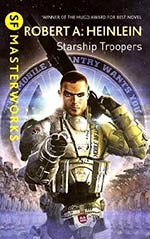
![]() Grayman14
Grayman14
3/14/2016
![]()
"Violence, naked force, has settled more issues in history than has any other factor."
"The bugs are not like us. The Pseudo-Arachnids aren't even like spiders. They are arthropods who happen to look like a madman's conception of a giant intelligent spider, but their organization, psychological and economic, is more like that of ants or termites; they are communal entities, the ultimate dictatorship of the hive."
-Robert A. Heinlein, Starship Troopers
I've picked two random quotes from this book to open with. I think most people reading this review will already be aware of this novel and what it's about; also the controversy that still surrounds it. It is only my third Heinlein book after Stranger in a Strange Land and The Door into Summer. I'm not very familiar with his work, but I know he is considered to be one of the Big SF writers of the so-called Golden Age of Science Fiction. This book won the Hugo Award for Best Novel in 1960.
I read Stranger in a Strange Land when I was a teenager, so I only have vague memories of it. I can't remember much about The Door into Summer except that there is a cat in it. I think it was the title that caught my eye and made me buy it. Starship Troopers is probably Heinlein's most famous book, partly because of the movie adaptation released in 1997. The movie satirizes the militaristic nature of the novel and has divided opinions about its merit
Heinlein's story is about a young man Johnny Rico's experiences before, during, and after training to become a space marine. It is set during an interstellar war between Earth and "the Arachnids of Klendathu." Surprisingly, there is very little action in the book with most of the narrative taking place in a military boot camp. The narration also flashes back to scenes of Johnny's high school classes in "History and Moral Philosophy".
"Man has no moral instinct. He is not born with moral sense. You were not born with it, I was not - and a puppy has none. We acquire moral sense, when we do, through training, experience, and hard sweat of the mind."
I know this is a popular novel but I didn't enjoy it. I found it too didactic, too preachy, and even pretty dull and boring at times. It felt like the author was standing on a soapbox shouting his opinions on how society should be run. It is very pro-military and has come under a lot of criticism for glorifying the role of the soldier in the "mobile infantry".
The best thing to come out of this novel is the idea and descriptions of the "Mobile Infantry Power Suits", a kind of exoskeleton combat suit that the soldiers wear. It significantly enhances their fighting skills and allows them to perform Superman-like jumps over tall buildings (in a single bound!) The opening chapter describes one of these amped up combat drops:
"And clang! -- it's my turn as my capsule slams into the firing chamber -- then WHAMBO! The explosion hits with a force that makes the Captain's braking maneuver feel like a love tap. Then suddenly nothing. Nothing at all. No sound, no pressure, no weight. Floating in darkness... free fall, maybe thirty miles up, above the effective atmosphere, falling weightlessly toward the surface of a planet you've never seen."
If you're interested in the detailed life of a soldier set in a SF setting then you might enjoy Starship Troopers. If you're a Heinlein fan then it's worth reading. If you want to see what all the fuss is about, take a look. But please note that the book is different to the movie version. The book is more about the author's philosophy on the reasons why wars are fought, as well as the roles and responsibilities of "citizens" to the state. The movie is a tongue-in-cheek satire of fascism and the military with more BOOM and more bugs. The choice is yours.
Two of my favourite lines:
"Happiness consists in getting enough sleep. Just that, nothing more."
"A boy who gets a C- in 'Appreciation of Television' can't be all bad."
Plus Robert A. Heinlein philosophising (with a hammer?...):
"War is not violence and killing, pure and simple; war is controlled violence, for a purpose. The purpose of war is to support your government's decisions by force. The purpose is never to kill the enemy just to be killing him... but to make him do what you want him to do. Not killing... but controlled and purposeful violence. But it's not your business or mine to decide the purpose of the control. It's never a soldier's business to decide when or where or how--or why--he fights; that belongs to the statesmen and the generals. The statesmen decide why and how much; the generals take it from there and tell us where and when and how. We supply the violence; other people--'older and wiser heads,' as they say--supply the control."
http://biginjapangrayman.wordpress.com